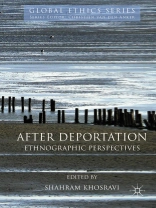This book analyses post-deportation outcomes and focuses on what happens to migrants and failed asylum seekers after deportation. Although there is a growing literature on detention and deportation, academic research on post-deportation is scarce. The book produces knowledge about the consequences of forced removal for deportee’s adjustment and “reintegration” in so-called “home” country. As the pattern of migration changes, new research approaches are needed. This book contributes to establish a more multifaceted picture of criminalization of migration and adds novel aspects and approaches, both theoretically and empirically, to the field of migration research.
Tabela de Conteúdo
1. Introduction .- 2. Fieldnotes from Cape Verde: On Deported Youth, Research Methods and Social Change .- 3. Starting Again: Life After Deportation from the United Kingdom .- 4. Helping Women Prepare for Removal: The Case of Jamaica .- 5. Back from the Other Side: The Post-Deportee Life of Nigerian Migrant Sex Workers .- 6. Paying to Go: Deportability as Development .- 7. Deportees Lost at ‘Home’: Post-Deportation Outcomes in Afghanistan .- 8. “My Whole Life Is in The USA”: Dominican Deportees’ Experiences of Isolation, Precarity, and Resilience .- 9. Making It as a Deportee: Transnational Survival in the Dominican Republic .- 10. Post-Deportation Movements: Forms and Conditions of the Struggle Amongst Self-Organising Expelled Migrants in Mali and Togo .- 11. Ripples Across the Pacific: Cycles of Risk and Exclusion Following Criminal Deportation to Samoa .- 12. “Non-Admitted”: Migration-Related Detention of Forcibly Returned Citizens in Cameroon .- 13. Deportation: The Last Word?.
Sobre o autor
Shahram Khosravi is Professor of Anthropology at Stockholm University, Sweden. He is author of
Young and Defiant in Tehran,
Precarious Lives: Waiting and Hope in Iran, and
‘Illegal’ Traveller: An Auto-Ethnography of Borders












